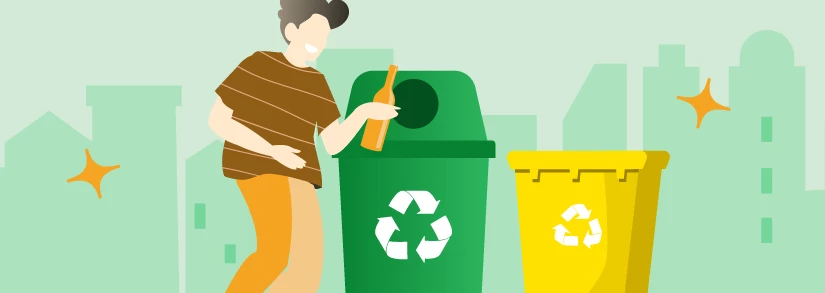Recycling Bins Ireland: Simple Waste Management

Recycling bins are a fundamental component of household life, but issues such as moving, managing lost bins, or navigating collection limits often require specific guidance. This guide aims to provide clarity on requesting, utilizing, and managing your domestic recycling bins within the context of Ireland’s 2025 waste management regulations.
Procedure for Requesting a Recycling Bin
When relocating or seeking a new waste collection provider to secure better pricing, the acquisition of recycling bins is necessary. These essential receptacles are typically provided by the chosen waste collection company at no separate charge as part of the service agreement.
When reviewing waste collection companies, potential customers will find several packages differentiated by:
- The types of bins included (Residual, Dry Recycling, and Bio-waste are now legally mandatory for all households).
- The volume or capacity of the bins.
- The charging structure (Pay by Weight, Pay by Lift, or Standard Service, all of which must comply with incentivised charging rules).
- The overall package price.
Upon confirmation of a chosen package, the provider will arrange for the delivery of the new bins, issue comprehensive guidance on proper usage, and confirm the collection schedule.
It is important to note that specialized recycling options, such as household glass recycling bins, may not be universally available, particularly in more rural areas. In such cases, alternative disposal methods, such as utilizing local Bring Banks, must be adopted.
Consult your local authority's website for available recycling infrastructure in your area.
Types of Household Recycling Bins
Irish households are legally required to be offered a minimum of three primary bins: Residual (General) Waste, Dry Recycling, and Organic (Bio-waste). Some regions or providers may offer a separate glass collection service, but the co-mingling of plastics, paper, and cardboard in a single dry recycling bin is standard practice.
For residents in apartments or flats, a communal bin area is typical, negating the need for individual wheelie bins. In these situations, the same segregation options are available in the communal facility. It is advisable to utilize personal mini-bins for domestic separation prior to transferring refuse to the communal bins.
These mini-recycling containers do not need to be supplied by the building's waste contractor; they are purely for internal transport. Mini-recycling bins are readily available from retailers, or can sometimes be obtained free of charge from the local authority or council.
Guidelines for Recycling Bin Contents
Correct segregation is paramount for effective recycling. Upon commencing service, waste collection firms generally supply a simple guide or chart detailing acceptable materials for each bin.
Strict adherence to these guidelines is crucial, as penalties apply for incorrect refuse disposal. Commercial enterprises face severe sanctions, including fines up to €15 million or up to 10 years imprisonment, for consistent improper waste disposal.
Similarly, domestic suppliers like Greyhound enforce compliance teams who inspect bins and can levy a €30 charge for each instance of improper recycling contamination.
While minor differences in acceptable materials exist between providers, the majority conform to the segregation details presented below. It is always prudent to check your specific supplier's requirements.
| General (Residual) | Recycling (Dry Mixed) | Compost/Organic (Bio-Waste) | Glass |
|---|---|---|---|
| Vacuum Cleaner Contents/Dust | Newspapers/General Paper & Magazines | General Food Waste (no packaging) | Glass Bottles of any Colour |
| Broken Delph/Pottery/Ceramics | Cardboard Boxes & Packaging (clean and dry) | Garden Waste (e.g., hedge cuttings, grass trimmings) | Jars |
| Soiled Food & Food-Contaminated Packaging | Tin/Steel & Aluminium Cans | Dead Plants & Flowers | Non-Food Bottles (e.g., Perfume, Aftershave) |
| Unrecyclable Packaging & Certain Plastics (e.g., contaminated, polystyrene) | Tetra-Pak Juice & Milk Cartons | Coffee Grounds, Paper Filters & Teabags | - |
| Plasters, Nappies, and other Sanitary Waste | Plastic Bottles and rigid plastic containers (lids on) | Cardboard & Paper Soiled by Food | - |
| Ash (must be cold) | Plastic Film/Soft Plastics (check supplier guidelines) | - | - |
Managing Full Recycling Bins or Exceeded Limits
The specific waste disposal plan selected may impose weight limitations, either annually or per lift.
Since recycling bins are weighed during collection, exceeding this agreed-upon weight limit will typically result in a penalty surcharge per kilogram over the maximum agreed-upon limit.
If this situation arises, householders have three options:
- Accept and pay the penalty for exceeding the weight limit of the bins.
- Pay the penalty and contact the service provider to discuss an upgrade to a bin of greater capacity or a higher-tier service plan.
- Utilize supplementary recycling or amenity centres to reduce the volume and weight of waste entering the kerbside bins.
Recycling and amenity centres are highly recommended for managing mid-month waste output. These facilities are free to the public, accept most forms of recycling, and can save the household money by preventing weight penalties.
Consult our comprehensive waste disposal guide for further information on responsible refuse management.
Modifying Recycling Bin Size or Service Package
Most providers permit upgrades to service packages or larger bin sizes if requirements change. If the current plan is under a fixed-term contract (e.g., six months or annual), a surcharge may be levied to cover the difference in service cost and potential administrative fees associated with the change.
For new residents unsure of their future waste output, some suppliers offer single-month or rolling contracts. This approach allows the householder to accurately gauge their requirements before committing to a long-term package that may prove insufficient or unnecessarily expensive.
Commercial Recycling Bins
As business waste requirements are highly specific, many commercial waste collection companies offer a complimentary waste audit. This audit measures expenditure, offers advice on reducing output, proposes cost-saving measures, and determines the appropriate volume of recycling bins or waste storage facilities for the site.
Many prominent waste collection services, such as Wiser Bins and Bord na Mona, operate in both the domestic and commercial sectors, offering the potential to utilize a trusted provider for both home and business waste needs.
Commercial recycling bins are available in a wide range of capacities, from the standard 140L to high-volume 1100L bins. In addition to general recycling services, many commercial suppliers offer specialized services like skip hire, confidential shredding, and hazardous waste disposal.
To receive a tailored quotation and discuss specific requirements, direct contact with the preferred service provider is necessary, as pricing is typically not published online for commercial clients.
